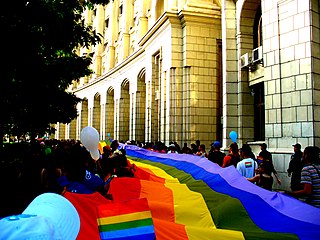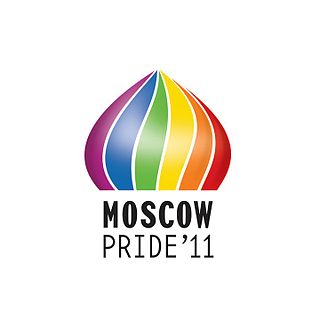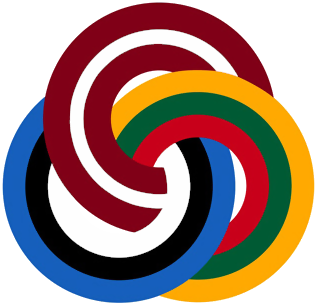
Ljubljana is the capital and largest city of Slovenia, located along a trade route between the northern Adriatic Sea and the Danube region, north of the country's largest marsh, inhabited since prehistoric times. It is the country's cultural, educational, economic, political and administrative center and the seat of Urban Municipality of Ljubljana.
Lesbian, gay, bisexual, transgender, queer, intersex, and asexual (LGBTQIA+) people frequently experience violence directed toward their sexuality, gender identity, or gender expression. This violence may be enacted by the state, as in laws prescribing punishment for homosexual acts, or by individuals. It may be psychological or physical and motivated by biphobia, gayphobia, homophobia, lesbophobia, aphobia, and transphobia. Influencing factors may be cultural, religious, or political mores and biases.

São Paulo LGBTQ Pride Parade is an annual gay pride parade that has taken place in Avenida Paulista, in the city of São Paulo, Brazil, since 1997. It is South America's largest Pride parade, and is listed by Guinness World Records as the biggest pride parade in the world starting in 2006 with 2.5 million people. They broke the Guinness record in 2009 with four million attendees. They have kept the title from 2006 to at least 2016. They had five million attendants in 2017. As of 2019 it has three to five million attendants each year. In 2019, it was also the second larger event of the city of São Paulo in terms of total revenue and the first in terms of daily revenue. In 2010, the city hall of São Paulo invested 1 million reais in the parade. According to the LGBT app Grindr, the gay parade of the city was elected the best in the world.

Lesbian, gay, bisexual, and transgender (LGBT) people in Bosnia and Herzegovina may face legal challenges not experienced by non-LGBT residents. Both male and female forms of same-sex sexual activity are legal in Bosnia and Herzegovina. However, households headed by same-sex couples are not eligible for the same legal protections available to opposite-sex couples.

Lesbian, gay, bisexual, and transgender (LGBT) people in Romania may face legal challenges and discrimination not experienced by non-LGBT residents. Attitudes in Romania are generally conservative, with regard to the rights of gay, lesbian, bisexual, and transgender citizens. Nevertheless, the country has made significant changes in LGBT rights legislation since 2000. In the past two decades, it fully decriminalised homosexuality, introduced and enforced wide-ranging anti-discrimination laws, equalised the age of consent and introduced laws against homophobic hate crimes. Furthermore, LGBT communities have become more visible in recent years, as a result of events such as Bucharest's annual pride parade, Timișoara's Pride Week and Cluj-Napoca's Gay Film Nights festival.

Lesbian, gay, bisexual, and transgender (LGBTQ) people in Turkey face legal challenges not experienced by non-LGBT residents, though the overall situation is considered to be less repressive when compared to most other Muslim-majority countries.

Bucharest Pride, known previously as GayFest, is the annual festival dedicated to LGBT rights in Romania, taking place in Bucharest for nearly a week. Current event organizer is Kyle David Kipp. It first took place in 2004 and now occurs in May–June of each year, culminating with the March of Diversity. It is organised by the non-profit organisation ACCEPT, the country's largest lesbian, gay, bisexual and transgender (LGBT) rights organisation. The festival also receives funding from the Romanian Ministry of Health and the National Council for Combating Discrimination, as well as a number of private organisations, such as the Open Society Institute and the British Council in Romania.

Zagreb Pride is the annual LGBTIQ+ pride march in the city of Zagreb, Croatia, which first took place in 2002, as the first successful pride march in Southeast Europe. Zagreb Pride organizers say their work was inspired by the Stonewall Riots and the Gay Liberation Front. It is self-identified as LGBTIQ+ march and therefore in 2003 changed its name from Gay Pride Zagreb into Zagreb Pride. The Pride was organized by a volunteer-based and grass-roots Organizing Committee that was formed each year. A new organization founded in 2008 as a non-governmental organization Zagreb Pride that also registered the use of the name as a brand. The organization is a member of InterPride, EPOA, IGLYO, ILGA-Europe and in 2010, together with Lesbian Organization LORI and Domino, it was the founding member of Croatian first national LGBT association, Center for LGBT Equality. Pride receives funding from the City of Zagreb and a number of international human rights organizations and embassies.

Lesbian, gay, bisexual, and transgender (LGBT) people in Moldova face legal and social challenges and discrimination not experienced by non-LGBTQ residents. Households headed by same-sex couples are not eligible for the same rights and benefits as households headed by opposite-sex couples. Same-sex unions are not recognized in the country, so consequently same-sex couples have little to no legal protection. Nevertheless, Moldova bans discrimination based on sexual orientation in the workplace, and same-sex sexual activity has been legal since 1995.

Lesbian, gay, bisexual, and transgender (LGBT) rights in Slovenia have significantly evolved over time, and are considered among the most advanced of the former communist countries. Slovenia was the first post-communist country to have legalised same-sex marriage, and anti-discrimination laws regarding sexual orientation and gender identity have existed nationwide since 2016.

Moscow Pride is a demonstration of lesbians, gays, bisexuals, and transgender people (LGBT). It was intended to take place in May annually since 2006 in the Russian capital Moscow, but has been regularly banned by Moscow City Hall, headed by Mayor Yuri Luzhkov until 2010. The demonstrations in 2006, 2007, and 2008 were all accompanied by homophobic attacks, which was avoided in 2009 by moving the site of the demonstration at the last minute. The organizers of all of the demonstrations were Nikolai Alekseev and the Russian LGBT Human Rights Project Gayrussia.ru. In June 2012, Moscow courts enacted a hundred-year ban on gay pride parades. The European Court of Human Rights has repeatedly ruled that such bans violate freedom of assembly guaranteed by the European Convention of Human Rights.

Baltic Pride is an annual LGBT+ pride parade rotating in turn between the capitals of the Baltic states; Tallinn, Riga and Vilnius. It is held in support of raising issues of tolerance and the rights of the LGBT community and is supported by ILGA-Europe. Since 2009, the main organisers have been Mozaīka, the National LGBT Rights Organization LGL Lithuanian Gay League, and the Estonian LGBT Association.

The Ljubljana Marathon is a marathon organised in Ljubljana by the City Municipality of Ljubljana (MOL). It has been taking place since 1996 and attracts several thousand people each year.

Sofia Pride Parade is a peaceful march of LGBT people and their relatives and friends, which combines social and political protest with entertainment such as live concerts. It takes place every year in the month of June in Bulgaria's capital Sofia since 2008. The first Sofia Pride parade was held on June 28, 2008, on the same date as the Stonewall riots in New York City that occurred in 1969. Same-sex sexual activity became legal on May 1, 1968. Between 1968 and the collapse of communism in 1989, no publicly gay movements nor places of social gatherings existed. After democracy was established in 1990, several gay bars and clubs opened doors in the capital of Sofia as well as in Varna and Plovdiv.
Homosexuality in Serbia was first criminalised from 1860 through various regimes, until its first decriminalization in the Socialist Autonomous Province of Vojvodina in 1977. When Vojvodina was reintroduced fully into the Republic of Serbia legal system during the breakout of Yugoslavia, it was recriminalised again, until 1994, when it was decriminalised in the entire Serbia.

There have been pride parades in South Africa celebrating LGBT pride since 1990. South African pride parades were historically used for political advocacy protesting against legal discrimination against LGBT people, and for the celebration of equality before the law after the apartheid era. They are increasingly used for political advocacy against LGBT hate crimes, such as the so-called corrective rape of lesbians in townships, and to remember victims thereof.

The BIH Pride March is the LGBT pride parade in the city of Sarajevo, the capital of Bosnia and Herzegovina, which first took place in September 2019.

Montenegro Pride is the national LGBTIQ pride march in the city of Podgorica, the capital of Montenegro, which first took place for the first time in 2013. Since then Montenegro Pride has become an annual event. It is self-identified as an LGBTIQ pride rally.

Belgrade Pride is an annual pride parade held in Belgrade, Serbia to celebrate the lesbian, gay, bisexual, and transgender (LGBT) people and their allies. The first event was held in June 2001. Since 2014, Belgrade Pride has been organized annually without bans. The manifestation is a part of the Belgrade Pride Week, which in addition to the pride parade itself also includes cultural events, workshops, discussion panels, parties and a live concert as the closing event.
Shortly after the third Janša government took office in early 2020, a series of large, mostly-peaceful protests were held. The start of the protests coincided with the beginning of the COVID-19 pandemic in Slovenia, with temporary restriction of movement and public gatherings in force to curb the spread of the disease. Early protests included the display of flags and banners from balconies and windows. At the end of April, public rallies began to be organised; most protesters bicycled, since recreational movement was permitted in public places. Between April 2020 and April 2022, when a scheduled parliamentary election was held, there were 105 protest rallies organised each Friday by a coalition of non-governmental organisations and civil groups called "People's Protest Assembly". Besides the periodic Friday protests, there were occasional demonstrations called for by other groups, including protests against anti-Covid measures and pro-government rallies; notably, on 5 November 2020, protests organized by groups not associated with the regular protests led to riots. Several systemic and operative flaws were identified in the Police handling of the protests, including excessive use of force.



















